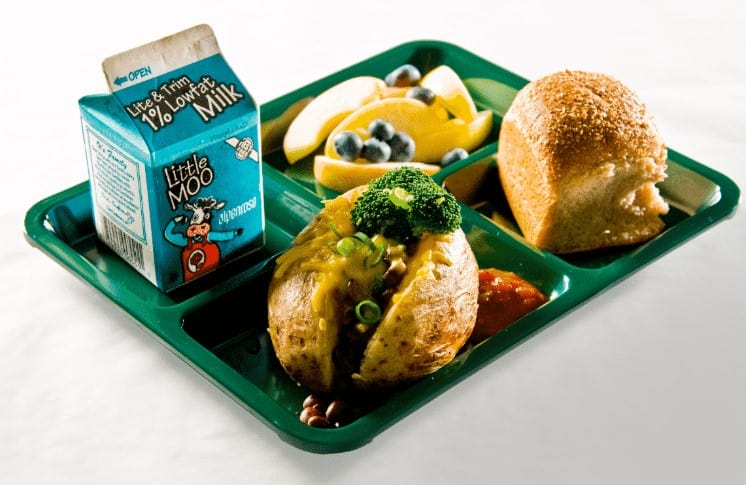Wisconsin potatoes make healthy back to school lunches simple, affordable, and delicious. Packed with potassium, vitamin C, fiber, and plant protein, they power kids through the school day. Whether you’re planning healthy back-to-school snacks or exploring back–to–school lunch ideas, potatoes provide the energy and nutrients students need for focus, growth, and success.
By: Jenny Heap, MS, RDN
For most families, back-to-school sales forecast the end of summer break and the beginning of a new academic year. As students return to the classroom, they can face a demanding challenge of balancing schedules, staying alert and focusing on their studies. Wisconsin grown potatoes provide essential vitamins and minerals—like potassium, vitamin C, and fiber—for the sustained energy and mental sharpness students need. Incorporating the potato—a nutrient powerhouse—in meals or healthy back-to-school snacks can set students up for success in and out of the classroom.
Why Potatoes Make Healthy Back-to-School Lunches
Potatoes, proudly grown in Wisconsin, are a nutrient-rich source of energy for active brains and bodies. Potatoes provide several nutrients essential for early-life development that fuel kids’ academic and physical performance. The combination of quality complex carbohydrates, fiber, and protein in potatoes helps sustain fullness to help kids stay focused and energized throughout the day.
Check out some of the key factors that make potatoes a nutrition powerhouse for heading back to school!
Potatoes Have Healthy Carbohydrates
One serving of potatoes provides 26g of complex carbohydrates. Carbohydrates are the primary fuel required by the brain and central nervous system. The Estimated Average Requirement (EAR) for both kids and adults– 130 grams of carbohydrates per day – was calculated based on the brain’s glucose requirements alone. A higher intake is recommended to support physical activity for busy student athletes. Nutrient-rich complex carbohydrates make potatoes an ideal fuel to support cognitive performance in kids.
Carbohydrates also serve as the main source of energy for muscles, which store carbohydrates as glycogen for easy access during exercise. For children who are involved in vigorous physical activity or team sports, it is important to fuel up before, during, and after intense activity to replenish glycogen stores and help delay muscle fatigue during longer workouts and team practices.
Potatoes Provide Fiber
One serving of potatoes provides 2g of fiber. Nothing interrupts focus in the classroom more than a growling stomach. Fiber is known to enhance fullness. While fiber is a carbohydrate, it deserves its own callout when it comes to potatoes. Fiber in potatoes is more than skin deep—about half of the fiber in a potato is found in the skin. Leaving the skin on during meal preparation provides more fiber and nutrients, though some benefits remain even when potatoes are consumed without the skin. Fiber also contributes to bowel regularity and is thought to have a positive impact on the gut microbiome.
Potatoes Supply Protein
One serving of potatoes supplies 3g of plant protein.
Protein provides the amino acid building blocks necessary for growth and development of every tissue in the human body, including muscle, bone, and connective tissue and skin. Hormones are also made up of protein building blocks, so it’s easy to see why adequate protein is so critical for normal growth and development during childhood. Potatoes are higher in protein than most other foods commonly consumed from the vegetables and legumes category. Protein in potatoes helps support students’ physical development and contributes to the feeling of fullness, helping them stay energized and focused throughout the school day.
Potatoes Deliver Iron
One serving of potatoes provides 1.1mg of iron.
Iron is extremely important in cognitive function and overall brain health. Potatoes can boost iron intake for students. Iron plays a critical role in the myelination of nerve fibers during early brain development, significantly impacting processing speed. Iron also makes it possible for hemoglobin to deliver life-sustaining oxygen to the muscles, brain, and all other body tissues. This nutrient is especially important for adolescent girls, who are at higher risk of iron deficiency.
A medium potato provides 1.1 mg of iron, or
- 11% of the AI for kids 4-8
- 14% for kids 9-13 (8)
- 10% for adolescent boys 14-18
- 7% for adolescent girls 14-18
Potatoes are a Source of Potassium
One serving of potatoes delivers 620mg of potassium.
Potassium helps regulate blood pressure and works closely with sodium to maintain fluid balance in our bodies. Potassium is an electrolyte that we need during exercise and is lost via sweat with young athletes. Potatoes are an excellent choice for fueling up before the game, ensuring young athletes have the energy and electrolytes necessary to perform at their best.
A medium potato provides 620mg of potassium, or:
- 27% of the AI for kids 4-8
- 25% for kids 9-13
- 21% for adolescent boys 14-18
- 27% for adolescent girls 14-18
There is Vitamin C in Potatoes
One serving of potatoes provides 20mg of vitamin C.
That amount goes a long way toward meeting daily requirements for children and adolescents. As kids head back to the classroom, Vitamin C is a crucial part of their diet. Vitamin C is essential for the synthesis of collagen, which provides structure and elasticity to connective tissues throughout the body. It also supports wound healing – important for all those inevitable playground scrapes! Vitamin C is also essential to the immune system, helping kids stay healthy in the classroom.
Vitamin C also improves the bioavailability of iron found in plant foods – good news for kids and families that are boosting their daily fruit and vegetable consumption.
A medium potato provides 27mg of vitamin C, or:
- 108% of the RDA for kids 4-8
- 60% for kids 9-13
- 36% for adolescent boys 14-18
- 42% for adolescent girls 14-18
Potatoes Provide Vitamin B6
One serving of potatoes provides 0.2mg of vitamin B6.
This B vitamin is necessary for numerous processes in the body, including proper immune function and the formation of hemoglobin, which carries oxygen to the brain, muscles, and all other parts of the body. B6 is also heavily involved in protein metabolism. Beyond these important roles, vitamin B6 helps synthesize neurotransmitters critical for brain development during pregnancy and infancy, which can significantly impact cognitive performance in childhood and throughout life.
A medium potato provides 0.2mg of vitamin B6, or:
- 30% of the RDA for kids 4-8
- 20% for kids 9-13
- 15% for adolescent boys 14-18
- 17% for adolescent girls 14-18
Whether baked, grilled or mashed – Wisconsin grown potatoes can be a powerhouse of nutrition for healthy back-to-school lunches. They fuel kids’ minds and bodies as they hit the books, lace up their sneakers and head back to school. Families can be assured that their student is fueled with the nutrients they need – all thanks to the potato!
About the Author:
Jenny Heap, MS, RDN, is a registered dietitian nutritionist who contributes nutrition expertise to the educational outreach of Wisconsin Potato and Vegetable Growers Association. Connect with Jenny on LinkedIn.


